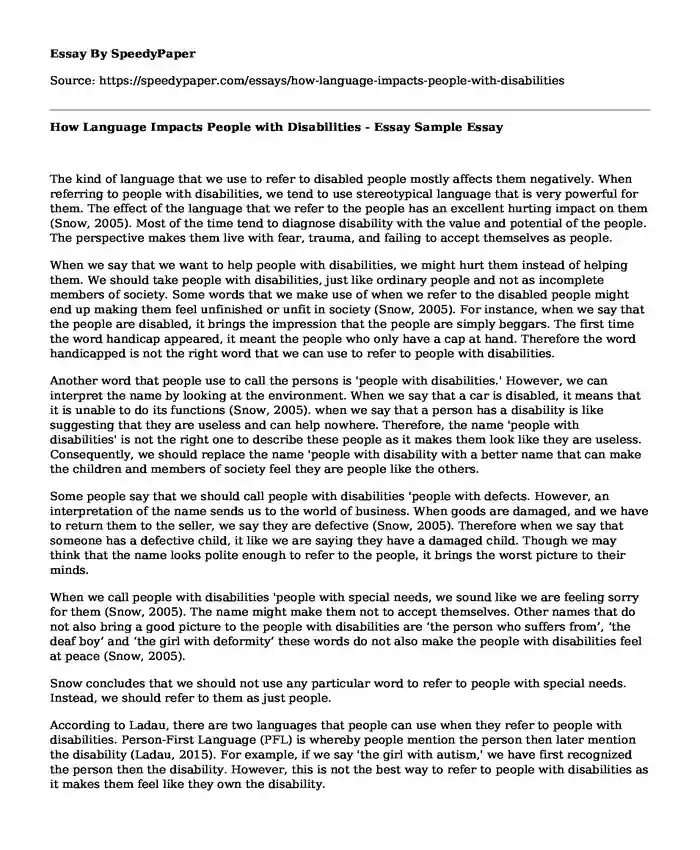
| Type of paper: | Essay |
| Categories: | Linguistics Medicine Science |
| Pages: | 3 |
| Wordcount: | 762 words |
The kind of language that we use to refer to disabled people mostly affects them negatively. When referring to people with disabilities, we tend to use stereotypical language that is very powerful for them. The effect of the language that we refer to the people has an excellent hurting impact on them (Snow, 2005). Most of the time tend to diagnose disability with the value and potential of the people. The perspective makes them live with fear, trauma, and failing to accept themselves as people.
When we say that we want to help people with disabilities, we might hurt them instead of helping them. We should take people with disabilities, just like ordinary people and not as incomplete members of society. Some words that we make use of when we refer to the disabled people might end up making them feel unfinished or unfit in society (Snow, 2005). For instance, when we say that the people are disabled, it brings the impression that the people are simply beggars. The first time the word handicap appeared, it meant the people who only have a cap at hand. Therefore the word handicapped is not the right word that we can use to refer to people with disabilities.
Another word that people use to call the persons is 'people with disabilities.' However, we can interpret the name by looking at the environment. When we say that a car is disabled, it means that it is unable to do its functions (Snow, 2005). when we say that a person has a disability is like suggesting that they are useless and can help nowhere. Therefore, the name 'people with disabilities' is not the right one to describe these people as it makes them look like they are useless. Consequently, we should replace the name 'people with disability with a better name that can make the children and members of society feel they are people like the others.
Some people say that we should call people with disabilities 'people with defects. However, an interpretation of the name sends us to the world of business. When goods are damaged, and we have to return them to the seller, we say they are defective (Snow, 2005). Therefore when we say that someone has a defective child, it like we are saying they have a damaged child. Though we may think that the name looks polite enough to refer to the people, it brings the worst picture to their minds.
When we call people with disabilities 'people with special needs, we sound like we are feeling sorry for them (Snow, 2005). The name might make them not to accept themselves. Other names that do not also bring a good picture to the people with disabilities are ‘the person who suffers from’, ‘the deaf boy’ and ‘the girl with deformity’ these words do not also make the people with disabilities feel at peace (Snow, 2005).
Snow concludes that we should not use any particular word to refer to people with special needs. Instead, we should refer to them as just people.
According to Ladau, there are two languages that people can use when they refer to people with disabilities. Person-First Language (PFL) is whereby people mention the person then later mention the disability (Ladau, 2015). For example, if we say 'the girl with autism,' we have first recognized the person then the disability. However, this is not the best way to refer to people with disabilities as it makes them feel like they own the disability.
The other type of language that we can refer to people with disabilities is the Identity First Language (IFL). In IFL, we first mention the identity of the person. According to Ladau, there is no problem if we say this is a deaf boy, but saying the boy who is deaf is not the right way (Ladau, 2015). if you must associate someone with a disability, there is no need to start with the person, and the identity should start.
Therefore, we should be keen when referring to the people with disabilities as the words that we use to apply to them will have an impact on the way they take themselves. If we have children with disability in our society or families, we should address them in a way that makes them feels as essential as any other member.
References
Ladau, E. (2020). Person-First Language Doesn't Always Put the Person First. Think Inclusive. Retrieved 28 July 2020, from https://www.thinkinclusive.us/why-person-first-language-doesnt-always-put-the-person-first/.
Snow. (2005). Amazon.com. Retrieved 28 July 2020, from https://www.amazon.com/Disability-Natural-Revolutionary-Successful-Disabilities/dp/B01FEKWQR0.
Cite this page
How Language Impacts People with Disabilities - Essay Sample. (2023, Oct 29). Retrieved from https://speedypaper.net/essays/how-language-impacts-people-with-disabilities
Request Removal
If you are the original author of this essay and no longer wish to have it published on the SpeedyPaper website, please click below to request its removal:
- Political Science Essay on Civil Liberties and Civil Rights
- Essay Example about Strengths-Based Model
- Essay Sample on the Crisis in the Humanities
- Free Essay on Mass Spectroscopy and Electrochemistry
- Women Should Have the Right to Abortion Despite Religion - Argumentative Essay
- Black Women's Voices in Poetry: Creative Expression & Activism
- Free Paper Sample on 2020 Presidential Election and the COVID-19
Popular categories




